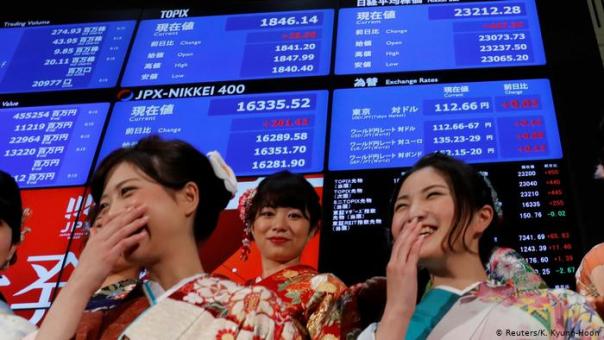Beyond “Black Days” in the Market: What’s Next?

As my institute “IISIA” correctly had forecasted since the last week of February 2020, the global financial market dramatically tumbled and reached its selling climax last week. Amid the financial turmoil, almost everybody seems to talk about the emerging recession of the world economy. Well, I fully understand such a sentiment in the society, however, this is unfortunately not the case. Why?
Apart from individual retail investors, nobody among leading institutional investors refers to “recession” actually. For him/her, there is ONLY volatilities, which enable him/her make profits. Thus, “going-down” in the market is, at least for him/her, welcome, as long as he/she can be well prepared in advance. The only question is, therefore, how long it will take before fixing his/her profit with deals.
In this regard, the current situation in the global financial market is quite easy to understand, conditioned that you’re well aware of the golden rule for state leadership in terms of governance of national economy. When the nation state’s economy flourishes, supply surpasses demand sooner or later. To avoid rapid recession due to such a situation, the government used to either officially or unofficially begin wars for increasing demands. This is exactly why the modern history has been always accompanied with devastating wars among nations.
The point is none of the current political leaders in the world can’t follow this golden rule because of two reasons: To execute a physical “war”, they’re urged to collect a huge amount of money. Facing accumulating sovereign debts, they’re awfully reluctant to do so in order not to fall into national default, a nightmare for political leaders. Having said that, even Donald Trump and Xi Jinping has domestically enough support in their societies to force their citizens to go to the battlefield. Particularly, Donald Trump really loves to do “verbal” wars through Twitters, but never declares a real “physical” war against his alleged “enemy countries”. This is also the case for other leaders of major countries including Europe, China and even Japan.
In this context, it’s COVID-19 (new coronavirus) that really matters to these poor political leaders. Due to spread of the virus, all the governments on the globe may now release their “emergency declaration” and limit physical and economic activities of their citizens. That is, of course, VERY VERY bad for national economies, which inevitably leads us to a “recession-like situation”. Nevertheless, the situation can be controlled both politically and artificially.

In the Tokyo stock market, NIKKEI 225 index recently abruptly fell down to 19,500 point at first, and then to 17500, while mass media loudly reported investors are in fear of wider spread of coronavirus in the Japanese society. As mentioned above, IISIA, my institute has been publicly announcing its forecast on the future financial market saying it’s about rather to rocket, which would be described “the very last stage of Japan’s bubble economy” afterwards. Having viewed the latest changes in the Tokyo stock market, I’m firmly confident facts will follow our forecast very soon.
17,500 point of NIKKEI 225 index is closely connected with irreversible insolvency of Bank of Japan, which has massively bought ETFs in the market since 2012. 19.500 point means, according to BOJ’s disclosed balance sheet, BOJ stops to enjoy profit due to increasing price of Japanese stocks. In short, BOJ simply returns to its “ground zero” and will begin to make the Tokyo stock market rocket again from 16 March, 2020, while Government of Japan suddenly starts to announce the domestic situation related to COVID-19 is allegedly under control. We’re just viewing Japanese style of “nobles oblige”, I think.
While other major economies still pretend to suffer from the wide and devastating spread of the new coronavirus, Japan tends to be regarded as “top runner” or even “last resort” in the financial market very soon. The GOJ is forced to persuade all the stakeholders that the Tokyo Olympiad 2020 shall be held according to its officially fixed schedule. To do so, GOJ will make use of all means including the next stage of quantitative easing by BOJ and withdrawal of the increase of consumption tax from 10 to 8 percent, which obviously oppressed further recovery of Japanese national economy. To Japan, special attention should be tentatively paid, since US and EU rather concentrate on decreasing the velocity of their economies’ growth by using the “COVID-19” trick. To wrap up, I herewith wanna say the Japanese stock market will rocket at least two months from 16 March, 2020, until the time when the Tokyo Summer Olympic Games in 2020 will be officially cancelled due to the on-going pandemic despite all the measures taken by GOJ.

Well, asking myself again, why Japan?? If you would belong to the gentlemen’s club called “freemasonry”, you’d be quite aware Japan is the nation which always gets breakthroughs for the sake of other parts of the world (Even though I’m not a member of the club, an Asian deep throat standing very close to me, once told this face with a written evidence.). What the global leaders expect to see is a “gnostic revolution of the world”. To make it happen, Japan shall be enough oppressed to jump into another dimension by thinking and doing outside the box. According to the Le Chatelier’s principle, Japan needs to be raised and go up dramatically, so as to go down drastically. The above shown “last stage of Japan’s bubble economy” with highly increasing stock price since 16 March, 2020 is strongly needed, so that the global leadership will be fully satisfied to see the next stage of the human civilization. The latest “Black Days” are the very beginning of the final story, being combined with the middle-sized earthquake in NOTO Peninsula in the midnight of 12 March, 2020. Stay tuned.






